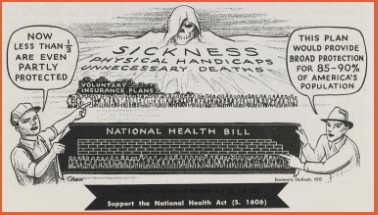
Background
Image credit: National Archives, Records of the Committee on Fair Employment Practice.
http://recordsofrights.org/records/128/for-the-peoples-health
To many Americans, healthcare is considered a human right. In fact, Harry S. Truman, 33rd president of the United States, said, “I put it to you, is it un-American to visit the sick, aid the afflicted or comfort the dying? I thought that was simple Christianity.” Harry Truman would carry on the legacy of FDR in trying to provide American men, women, children and elderly with national healthcare. Truman would pave the way for future presidents such as Lyndon Johnson, Bill Clinton and Barack Obama, whose administrations strove toward the same goal.
In 1945, President Truman proposed a national healthcare plan to Congress. In his plan, he outlined five main goals:
- Address the lack of trained healthcare professionals in all communities.
- Grow public health services.
- Increase funding to medical research and education.
- Lower the cost of individual medical care.
- Bring attention to the loss of income when severe illness takes hold.
Truman’s plan was that all Americans would pay a certain amount in fees and taxes each month to cover the new healthcare program’s costs. With a Democratic controlled House, Truman’s proposal turned into a bill that would end up as part of the Social Security expansion, but it was quickly shot down as people began to fear an increase in taxes. Some people even feared the program would be a “Communist” act, giving too much control to the federal government. This fear was spread specifically by the American Medical Association (AMA). The bill was also halted by Republican Senator Robert Taft’s Taft-Smith-Ball Bill, which would allow states to make healthcare private. As Republicans regained control of the House in 1946, Truman’s healthcare bill died. Truman considered this a failure of his presidency.
The United States would continue its fight over national healthcare during Lyndon B. Johnson’s presidency. In 1965, Johnson signed the Medicare Act of 1965, which would provide healthcare to U.S. citizens age 65 and older. Harry and Bess Truman were present at the signing, and President Johnson dubbed former President Truman “the real daddy of healthcare.” The issue came to the forefront again during the Clinton and Obama administrations. While the Affordable Care Act was signed into law during Barack Obama’s term, opposition to the legislation continues. Many people disagree with the federal government’s involvement and mandates where healthcare is concerned. These arguments echo the backlash against Truman’s, Clinton’s and even Johnson’s bills. Harry S. Truman paved the way for healthcare reform in the United States, and criticisms against his bill have also remained throughout American history.
Key Question
What led to Truman’s failure to pass a healthcare bill during his presidency?
Directions
Materials
Documents to be examined:
- Truman’s response to Dr. Lewis Moorman, July 16, 1947
- Truman’s response to Ben Turoff, April 12, 1949
- Letter to President Truman from the Montana Association of Life Underwriters, June 22, 1949
- Cover of “The Road Ahead” by John T. Flynn, 1949
- Political Cartoon, “Still Just as Hard to Swallow,” 1946
- Article outlining the AMA’s argument against Truman’s healthcare proposal, April 28, 1949
- “Studies, Surveys, Reports, and Proposals,” July 1, 1949
- Memorandum about the Taft-Smith-Ball bill, 1947
- Letter from citizen F.C. LeBlond to Harry S. Truman, November 27, 1945
- Letter from small business owner W.I. Sargent to Harry S. Truman, January 4, 1946
- AMA postcard to senators regarding President Truman’s healthcare plan